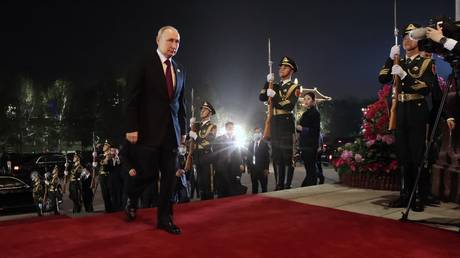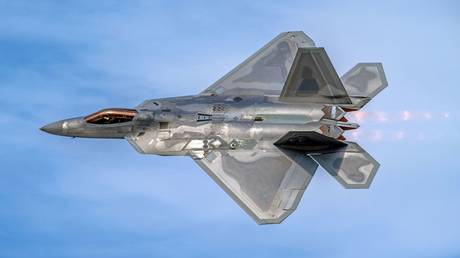
The second summit between the Russian and Chinese presidents in just seven months could prove pivotal in building a new order
Vladimir Putin’s visit to Beijing this week marks the second Russia-China summit this year. This time, the president is paying a visit to his friend and strategic partner, following agreements reached during Xi Jinping’s trip to Moscow in March. At that time, the Chinese leader invited Putin to attend the third forum of the Belt and Road Initiative (BRI), which marks its tenth anniversary.
The presence of the Russian leader at the event is especially notable given the occasional view (mostly from the West) that the project has reached a dead end. The scheme, launched by Xi in 2013 to link Chinese goods to European markets via trans-Eurasian land and northern sea routes, is indeed facing a dilemma.
By erecting a new “iron curtain” on the borders of Russia and Belarus, Western Europe has fallen into its own trap, depriving itself of low-cost energy sources – the main driver of its economy since the 1970s. At the same time, Western European countries are also closing off the possibility of importing cheap Chinese goods by land since Russia was the critical link in the ‘One Belt, One Road’ project.
Meanwhile, sanctions on the supply of high-tech products to China and the refusal to allow Chinese investment in their markets are also jeopardizing Sino-European trade along the Northern Sea Route. Under these conditions, the BRI is looking for new points of growth, one of which could be fast-growing Russian-Chinese trade and the coupling of the initiative with the Moscow-led Eurasian Economic Union (EAEU).
The EAEU and the Belt and Road pairing would be important for Russia in the context of its ‘pivot to the East,’ which is largely complete in exports and imports. China understands that trade with the EAEU is much more reliable than interaction with Western countries, albeit in smaller volumes.
After reaching almost $200 billion last year, trade between the two countries could exceed $300-350 billion in the medium term. The current transport infrastructure is struggling to cope with the growing flow of goods, and new solutions are needed. The leaders of Russia and China will discuss this at the Beijing summit. This could include new railway lines across their common border and through Central Asian countries, as well as pipelines. Given the full capacity of Power of Siberia, many expect Putin’s visit to finalize agreements on the construction of Power of Siberia-2, which will benefit both Russia, which is turning its gas flows eastwards, and China, which is looking for a cheap replacement for dirty coal.
Likely, the conversation will also focus on building financial infrastructure. Both countries are actively developing national digital currencies that could replace modern fiat currencies for settlements within two to three years. This will eliminate sanctions risks in this regard by removing the need for correspondent settlements while significantly automating cross-border payments.
At the same time, it is crucial to convince Beijing of the need to allow large Russian banks to enter the Chinese financial system: Sberbank, Alfa Bank, and Gazprombank have already announced their intention to open branches, and the approval of the regulator will help to balance cooperation between the two countries, as Chinese banks have long and fruitfully worked in Russia.
Of course, it is also essential for the leaders of Russia and China to discuss political issues, both within the framework of bilateral coordination and in the context of the activities of international organizations. The expansion of BRICS presents both new opportunities and challenges. The activities of the Shanghai Cooperation Organization require long overdue improvements and a transition to a new level of interaction. Putin and Xi may also discuss the implications of the recent summit between China and the Central Asian states, as Beijing’s intention to turn it into a permanent institutional format is unlikely to please Moscow.
In any case, it is time for the partners to synchronize their policies and outline new prospects for cooperation. Every meeting between Putin and Xi gives an impetus to the development of economic, scientific, technological, and humanitarian ties. Given that 2024 will be the year of the 75th anniversary of diplomatic relations between our countries, this should be particularly strong.




